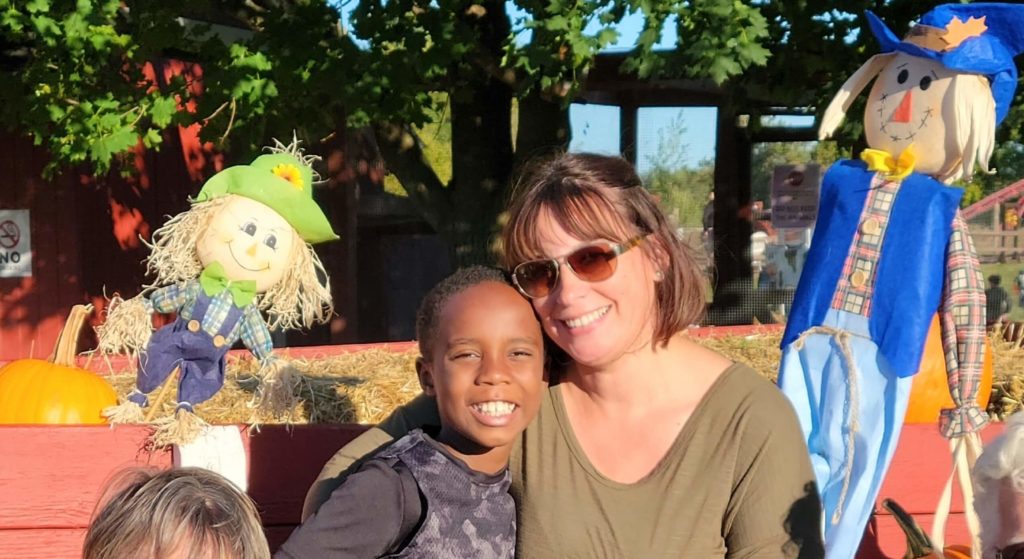
A self-proclaimed “workaholic,” Jennifer Stevens came to realize the years were swiftly passing by and she had yet to start a family. She desperately wanted to share her home with children, so she gave some serious thought to becoming a foster parent.
“I actually work in child welfare. I have for over 20 years,” said Stevens. “I was out in the community talking about this high need for foster families. And, I thought, well how come I’m not just doing it myself. Why am I just talking about the problem and not doing something about it?”
She reached out to Judson Center in 2018 for guidance. 
“I considered the location and reputation of the organization,” Stevens said. “I was familiar with several of the private agencies. Judson Center was one that I was confident would do well for the children and families, as I’ve participated in many meetings where Judson has been at the table and they always presented as knowledgeable and compassionate.”
Stevens eventually fostered two children through the human services agency. In addition, she gave short-term care to two little girls in respite foster care, a support service offered when foster parents have an emergency or need a break.
“I was really looking to kind of help some families by taking youth in, just because I knew there was a need, and I wanted children in my home anyhow. I just didn’t make it happen by traditional means,” she said with a laugh. “And so, I thought, well I have always wanted to have a family, and I’m getting older now. Let me just go ahead and try to help out. I wasn’t necessarily planning to adopt, although I wasn’t opposed to it.”
Adoption became a reality for Stevens in 2020 and 2022 when she gave the two children she had been fostering a forever home. Judson Center was there for her throughout her foster care and adoption journey.
“All of the Judson workers — from licensing to foster care to adoption and including supervisors — have been responsive and have shown concern for the best interests of the children in my home,” said Stevens. “When I have had questions or concerns, they have made it easy to connect with them to discuss those matters. When they came across additional resources that they thought I or my children could use or would be interested in, they took the time to share those. I mostly have appreciated that I could reach out to anyone on the staff and get a timely response.”
 The single, working mother dedicates much of her time and attention to 4 ½-year-old Emily and 9 ½-year-old Ja-Dereon. When asked how the children have changed her life, Stevens laughs.
The single, working mother dedicates much of her time and attention to 4 ½-year-old Emily and 9 ½-year-old Ja-Dereon. When asked how the children have changed her life, Stevens laughs.
“How has it not changed my life? That would be a shorter list. Again, I was a workaholic. And I have not been able to work the way I used to. I cannot work until 10 or 11 o’clock at night any more. They don’t let me. My priorities have just definitely changed.
“My house is a disaster now. My car is a disaster. That’s what people would say when they learned I was getting licensed. They said, ‘Do you know kids are messy?’ And I said, ‘I know, and I can embrace it.’ So, I have now embraced the fact that there are always toys out all over the place or crumbs around. All of these things that need to be cleaned up.”
Another adjustment for Stevens involved the cross-racial placement and adoption of Ja-Dereon. He is African American. Stevens is white.
“I prepared for the possibility of having a cross-racial placement by having books and toys available that represented a mix of cultures,” she said. “I also made sure I became familiar with as many of his cultural traditions as possible by talking with his biological father about food, activities, religion, bedtime routines, and other preferences. I connected with friends to help learn how to maintain his hair and skin appropriately. He has been with me for 3 ½ years, and we have always been open about talking about our differences in our home.”
These conversations included a heart-to-heart discussion with Ja-Dereon about whether he would be comfortable living with Stevens permanently.
“He decided that he preferred to stay with me than to live with someone he doesn’t know but who looks more like him,” Stevens explained. “We had formed a good bond, and he has a great bond with our extended family, too. For me, I knew that I wanted to make him feel like part of the family, but also feel a connection to his own race and identity. I did reach out to his caseworker and mentioned interest in learning more about cross-cultural placements and adoption. She sent me some trainings, and I also sought out additional training to learn about Black history, along with raising an African American child. 
“I think what I have learned is that it really comes down to love and respect. Loving him and respecting him means that I sometimes step out of my comfort zone to talk about the things I am unsure about, learn about things I thought I knew but really didn’t, and create a space that he feels comfortable asking questions and being open about his feelings. I have to say, I have learned a lot about me on this journey, too.”
To learn more about foster care or adoption call (313) 255-8272 or email us at [email protected] and [email protected]
